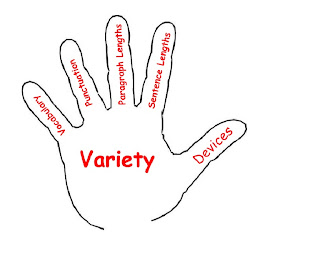I know a lot of the preparation for the Spoken Language study has been disrupted by the mock exam fortnight. So here is a re-cap of what we've covered so far:
Assessment Objectives in a Nutshell:
1) You need to analyse / evaluate the use of Spoken Language.
2) You need to be aware of / analyse / evaluate attitudes to Spoken Language.
3) You need to be aware of the way you use language and why.
Focus - Chat Shows
Throughout the unit we have covered the following topics:
1) The difference between accent and dialect and attitudes towards these.
2) Slang and Overt / Covert Prestige Language.
3) Grice's Maxims
4) Turn-Taking and Back Channeling Behaviour
5) Features of Spontaneous Speech.
Looking at the first two points - this video illustrates them perfectly.
Kevin and Perry
Here we have examples of Accent and Overt / Covert Prestige language.
Covert Prestige language is where you modify your language to associate yourself with an exclusive / secretive group. In the clip we see that Perry has been to Manchester to see Oasis and he has modified his language to associate himself with the band and their followers. He has also changed his accent to make himself sound like he is from Manchester.
You also have Kevin using a different type of Covert Prestige language in the beginning where he speaks in a way that identifies himself with teenage culture. As the sketch progresses, he tries to align himself with Perry by modifying his language to associate himself with Perry, but the humour is created as he ends up speaking like a Yorkshireman.
When Kevin's Mum appears Perry modifies his language to use Overt Prestige language to appear polite. Over Prestige language is the widely used dominant way of speaking and he associates himself with the idea of education / manners / good up bringing by using this.
If we apply this to our focus of Chat Shows, often the chat show hosts will modify their language to suit their guest as we will see with an example below. This could be to make the guest feel more comfortable or for a humorous effect.
So what is the point of a Chat show?
Purpose: To entertain and to Inform (For celebrities appearing on the show it is often to persuade the wider audience to take an interest in them / a product)
Audience: For the Chat Show Host it is a case of balancing two audience - The Guest and the Viewers.
Demograhics - Often Female in an age bracket of Twenties plus (some can be more specific depending on the show)
Format: Guests come on and they are interviewed.
Looking at these clips we can see evidence of Overt / Covert Prestige Language
Jonathan Ross with Jay Z
Jonathan Ross with Stephen Fry
With Jay Z, Jonathan Ross uses Covert Prestige language in such an awkward way it creates humour, whereas he uses Overt Prestige language for Stephen Fry again meeting the entertainment purpose of the show.
Grice's Maxims are the rules which govern polite conversation. We would expect these to be followed on a chat show but they can be FLOUTED for a specific effect or VIOLATED unintentionally.
The Maxims are:
Quantity: Give the right amount of information.
·Make your contribution as informative as is appropriate
·Do not make your contribution more informative than is appropriate.
Quality: Try to make your contribution one that is true.
·Do not say what you believe to be false
·Do not say that for which you lack adequate evidence
Relevance: Be relevant.
Manner: Be clear.
·Avoid obscurity of expression
·Avoid ambiguity
·Be brief (avoid unnecessary wordiness)
·Be orderly
With Stephen Fry - Jonathan Ross flouts the Manner Maxim in an attempt to show his intelligence but self-consciously aware that this is humorous for the audience.
Jay-Z on the other hand flouts the Quantity Maxim, which makes the interview awkward but also serves to create an enigma around his persona developing the impression that he is mysterious and therefore deserves more attention.
Graham Norton Show is a perfect example of the importance of Back-Channeling and Turn-Taking behaviour. His show is unusual because all the guests are sat on the sofa at the same time and the interview doesn't necessarily focus specifically on one star. It is important for Norton to use turn-taking cues to manage the guests need to speak and promote themselves but also to back-channel to show interest in the guests ideas.
For the guests they have to be aware that they are on camera at all times and need to seem interested in what the others are saying to avoid appearing sulky or aloof.
Turn-Taking Cues:
- Completed grammatical structure. 'I have had a very tiring day'.
- A rising intonation at the end of the sentence. (brought in from Australian 'soaps').
- Asking a question. 'How are you?'
- Naming another person.
- Seizing a turn by interrupting an unfinished sentence.(marked in transcripts by '......')
- When one speaker overlaps the other and one stops speaking.(marked in transcripts with '/')
Back Channeling:
Continuers: Hand the floor back to the speaker. 'mmm', 'uh-huh'
Acknowledgers: Express agreement/understanding 'mm'. 'yeah'
Assessors: Express appreciation. 'wonderful', 'how awful'
Newsmarkers: Mark the speaker's turn as news. 'really!' , 'Is it?'
Questioners: Ask for further details. 'and then?'
Collaborators: Finish another person's utterance.
Non-Verbal: Laughter, sighs, frowns' etc.
Graham Norton - Will Smith, Bradley Cooper, Jaden Smith, Heather Graham
Finally - though chat shows are heavily researched and questions carefully planned and evaluated, they need to have an air of spontaneity to them to have a natural feel and to put the audience / guests at ease.
In this Letterman clip a spontaneous question about Boris Johnson's hair creates humour and in this clip from Graham Norton an unexpected question for Salma Hayek becomes initially awkward as Hayek displays elements of spontaneous speech which indicate she feels slightly uncomfortable.
Boris Johnson on Letterman
Salma Hayek on Graham Norton Show
Overall - your job is to look at how the host and guests manage the chat show experience and analyse the effect they are trying to have in their use of language. As a higher level candidate you will also cover what the audience are likely to think about this and how successful you think the Chat Show host has been in creating an effective interview.
This isn't just about finding the techniques it is about being able to analyse their effect and evaluate success.
Good luck planning and keep watching Chat Shows to build your data from.



